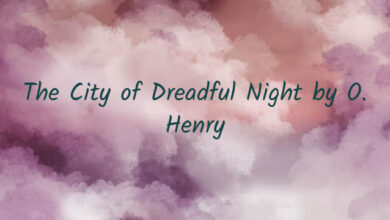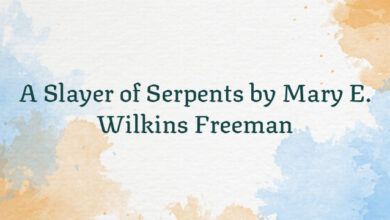
The Shyness of Shorty by Rex Ellingwood Beach
Bailey smoked morosely as he scanned the dusty trail leading down across the “bottom” and away over the dry grey prairie toward the hazy mountains in the west.
From his back-tilted chair on the veranda, the road was visible for miles, as well as the river trail from the south, sneaking up through the cottonwoods and leprous sycamores.
He called gruffly into the silence of the house, and his speech held the surliness of his attitude.
“Hot Joy! Bar X outfit comin’. Git supper.”
A Chinaman appeared in the door and gazed at the six-mule team descending the distant gully to the ford.
“Jesse one man, hey? All light,” and slid quietly back to the kitchen.
Whatever might be said, or, rather, whatever might be suspected, of Bailey’s road-house–for people did not run to wordy conjecture in this country–it was known that it boasted a good cook, and this atoned for a catalogue of shortcomings. So it waxed popular among the hands of the big cattle ranges near-bye. Those given to idle talk held that Bailey acted strangely at times, and rumour painted occasional black doings at the hacienda, squatting vulture-like above the ford, but it was nobody’s business, and he kept a good cook.
Bailey did not recall the face that greeted him from above the three span as they swung in front of his corral, but the brand on their flanks was the Bar X, so he nodded with as near an approach to hospitality as he permitted.
It was a large face, strong-featured and rugged, balanced on wide, square shoulders, yet some oddness of posture held the gaze of the other till the stranger clambered over the wheel to the ground. Then Bailey removed his brier and heaved tempestuously in the throes of great and silent mirth.
It was a dwarf. The head of a Titan, the body of a whisky barrel, rolling ludicrously on the tiny limbs of a bug, presented so startling a sight that even Hot Joy, appearing around the corner, cackled shrilly. His laughter rose to a shriek of dismay, however, as the little man made at him with the rush and roar of a cannon ball. In Bailey’s amazed eyes he seemed to bounce galvanically, landing on Joy’s back with such vicious suddenness that the breath fled from him in a squawk of terror; then, seizing his cue, he kicked and belaboured the prostrate Celestial in feverish silence. He desisted and rolled across the porch to Bailey. Staring truculently up et the landlord, he spoke for the first time.
“Was I right in supposin’ that something amused you?”
Bailey gasped incredulously, for the voice rumbled heavily an octave below his own bass. Either the look of the stocky catapult, as he launched himself on the fleeing servant, or the invidious servility of the innkeeper, sobered the landlord, and he answered gravely:
“No, sir; I reckon you’re mistaken. I ain’t observed anything frivolous yet.”
“Glad of it,” said the little man. “I don’t like a feller to hog a joke all by himself. Some of the Bar X boys took to absorbin’ humour out of my shape when I first went to work, but they’re sort of educated out of it now. I got an eye from one and a finger off of another; the last one donated a ear.”
Bailey readily conceived this man as a bad antagonist, for the heavy corded neck had split buttons from the blue shirt, and he glimpsed a chest hairy, and round as a drum, while the brown arms showed knotty and hardened.
“Let’s liquor,” he said, and led the way into the big, low room, serving as bar, dining- and living-room. From the rear came vicious clatterings and slammings of pots, mingled with Oriental lamentations, indicating an aching body rather than a chastened spirit.
“Don’t see you often,” he continued, with a touch of implied curiosity, which grew as his guest, with lingering fondness, up-ended a glass brimful of the raw, fiery spirits.
“No, the old man don’t lemme get away much. He knows that dwellin’ close to the ground, as I do, I pine for spiritual elevation,” with a melting glance at the bottles behind the bar, doing much to explain the size of his first drink.
“Like it, do ye?” questioned Bailey indicating the shelf.
“Well, not exactly! Booze is like air–I need it. It makes a new man out of me–and usually ends by gettin’ both me and the new one laid off.”
“Didn’t hear nothing of the weddin’ over at Los Huecos, did ye?”
“No! Whose weddin’?”
“Ross Turney, the new sheriff.”
“Ye don’t say! Him that’s been elected on purpose to round up the Tremper gang, hey? Who’s his antagonist?”
“Old man Miller’s gal. He’s celebratin’ his election by gettin’ spliced. I been expectin’ of ’em across this way to-night, but I guess they took the Black Butte trail. You heard what he said, didn’t ye? Claims that inside of ninety days he’ll rid the county of the Trempers and give the reward to his wife for a bridal present. Five thousand dollars on ’em, you know.” Bailey grinned evilly and continued: “Say! Marsh Tremper’ll ride up to his house some night and make him eat his own gun in front of his bride, see if he don’t. Then there’ll be cause for an inquest and an election.” He spoke with what struck the teamster as unnecessary heat.
“Dunno,” said the other; “Turney’s a brash young feller, I hear, but he’s game. ‘Tain’t any of my business, though, and I don’t want none of his contrac’. I’m violently addicted to peace and quiet, I am. Guess I’ll unhitch,” and he toddled out into the gathering dusk to his mules, while the landlord peered uneasily down the darkening trail.
As the saddened Joy lit candles in the front room there came the rattle of wheels without, and a buckboard stopped in the bar of light from the door. Bailey’s anxiety was replaced by a mask of listless surprise as the voice of Ross Turney called to him.
“Hello there, Bailey! Are we in time for supper? If not, I’ll start an insurrection with that Boxer of yours. He’s got to turn out the snortingest supper of the season to-night. It isn’t every day your shack is honoured by a bride. Mr. Bailey, this is my wife, since ten o’clock A. M.” He introduced a blushing, happy girl, evidently in the grasp of many emotions. “We’ll stay all night, I guess,”
“Sure,” said Bailey. “I’ll show ye a room,” and he led them up beneath the low roof where an unusual cleanliness betrayed the industry of Joy.
The two men returned and drank to the bride, Turney with the reckless lightness that distinguished him, Bailey sullen and watchful.
“Got another outfit here, haven’t you?” questioned the bridegroom. “Who is it?”
Before answer could be made, from the kitchen arose a tortured howl and the smashing of dishes, mingled with stormy rumblings. The door burst inward, and an agonized Joy fled, flapping out into the night, while behind him rolled the caricature from Bar X.
“I just stopped for a drink of water,” boomed the dwarf, then paused at the twitching face of the sheriff.
He swelled ominously, like a great pigeon, purple and congested with rage. Strutting to the new-comer, he glared insolently up into his smiling face,
“What are ye laughin’ at, ye shavetail?” His hands were clenched, till his arms showed tense and rigid, and the cords in his neck were thickly swollen.
“Lemme in on it, I’m strong on humour. What in




